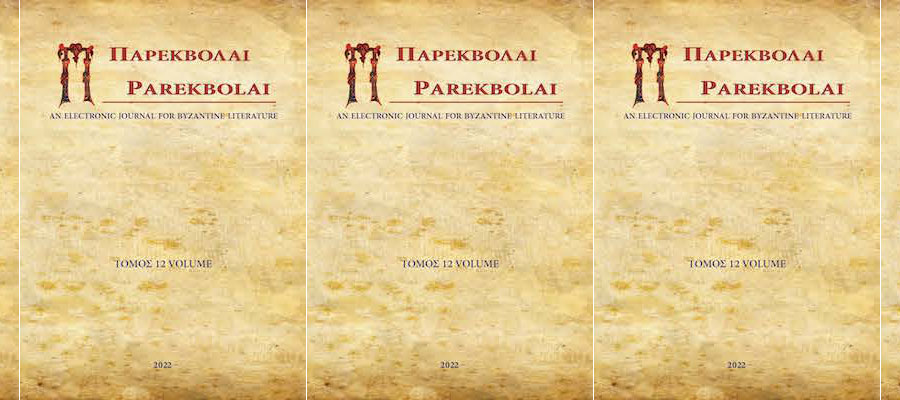Parekbolai. An Electronic Journal for Byzantine Literature, volume 12 (2022).
CONTENTS
Self-Portrait from the Exile: Nikephoros Basilakes’ Third Letter
Giulia Gollo
Nikephoros Basilakes was a Byzantine rhetorician of the second half of the twelfth century, whose works have all in all recently drawn scholars’ attention. In this paper, I will focus on one of his minor works, namely the Letters. We have four surviving letters written during the exile of the author, in which nostalgia, solitude, and discomfort are a predominant part of his self-expression. After a brief introduction on the main themes of the four letters, I will analyse the complex literary pattern that characterizes the third one (offering also the first-ever translation into a modern language), in which the sophisticated combination of “reused” materials taken from the Classics and the Holy Scriptures, the resignification of traditional images and the overlapping of several meanings can be found as typical elements of Basilakes’ writing.
Finding the Right Words: a Letter to the Emperor (Laur. plut. 55.4, f. 197v) – Books, Education and Rhetoric in a Late Byzantine Household
Philip Rance
This paper examines annotations inscribed in three manuscripts by Demetrios Laskaris Leontares (1418 – post-1475), an aristocrat whose possession or use of a dozen codices is documented. Palaeographic and historical criteria place all three texts in his adolescence around the 1430s. The primary focus is tenth-century Laur. gr. 55.4, a well-known collection of military treatises, in which successive generations of the Laskaris Leontares family inserted notices on personal and imperial events (1408-50). Overlooked by previous scholarship, on blank folio 197v Demetrios Leontares penned and signed a short letter addressed to an emperor, which constitutes a rare autograph specimen of Byzantine epistolography. This item was previously transcribed by Bandini (1768), who declined to edit and interpret its ‘barbaric and utterly illiterate’ script. Providing a new edition and first translation, this study situates the text within the evolution of epistolographic conventions in the early fifteenth century, as evidenced in contemporary letters and/or prescribed in letter-writing manuals. Whether interpreted as a draft or copy of an actual letter or a classroom exercise, this short private text adds uncommon ‘domestic’ and documentary dimensions to the study of Late Byzantine rhetoric, ideology and epistolary culture. The investigation widens to include two other undated annotations that can likewise be assigned to Demetrios Leontares’ youth: a co-ownership notice in recently commissioned Marc. gr. Z. 399 (5r) and a previously unpublished missive to an unnamed relative in twelfth-century Vat. gr. 586 (429v). Collective consideration of these three modest informal texts assists in clarifying their contexts and chronology, while elucidating broader themes of children, education, language and books in an aristocratic household.
Lines that do not lie anywhere: Italikos, Psellos, Xiphilin
David Jenkins
In the mid-twelfth century, the philosopher Michael Italikos wrote two letters in which he characterizes the objects of philosophical study. In both instances he identifies concepts of obvious Neoplatonic provenance, but he curiously begins each list with “lines that do not lie anywhere,” a notion immediately reminiscent of Michael Psellos and his famous letter to John Xiphilin almost a century prior. Psellos here defends his use of these lines, even claiming that they “are the principles of the whole of natural science.” What exactly are these lines and why are they so fundamental to the philosophies of both Psellos and Italikos? This paper examines the specific context within which Middle Byzantine philosophers would have engaged this idea, an examination largely informed by Psellos’ funeral oration for Xiphilin himself, and concludes that “lines that do lie anywhere” are incommensurable magnitudes.
A Self-Portrait of an Unyielding Unionist. The Historia dogmatica of George Metochites and the Fight for Church Unity
Francesca Samorì
The name of George Metochites (ca. 1250-1328) is linked to the union of Lyon (1274) and the religious conflicts that broke out after the death of Michael VIII Palaeologus (December 1282) and thedeposition of the unionist leaders (January 1283). Despite the condemnations that were imposed upon him, he continued to support the Union of the Churches and the procession of the Holy Spirit a Patre Filioque: being an outcast and a political convict for the last 45 years of his life (1283-1328), he composed four polemical works, among which the Historia dogmatica is considered to be the most important one. As part of my PhD project dealing with the preparation of the critical edition of the Historia, in this paper I propose to examine, through some autobiographical sections of the first book, how and why Metochites aims at vividly depicting himself as an inflexible unionist. Presenting the first critical edition of some of the most revealing passages (with an English translation), I will try to establish the reasons that guided this subtle operation. In fact, the whole textual construction is intended as a way to protest against the injustice of the anathema imposed on him (and on his unionist companions) by the Tomos of Gregory II (1285) and to prove that none of them should be considered heretics – on the contrary, they always fought for the truth.
